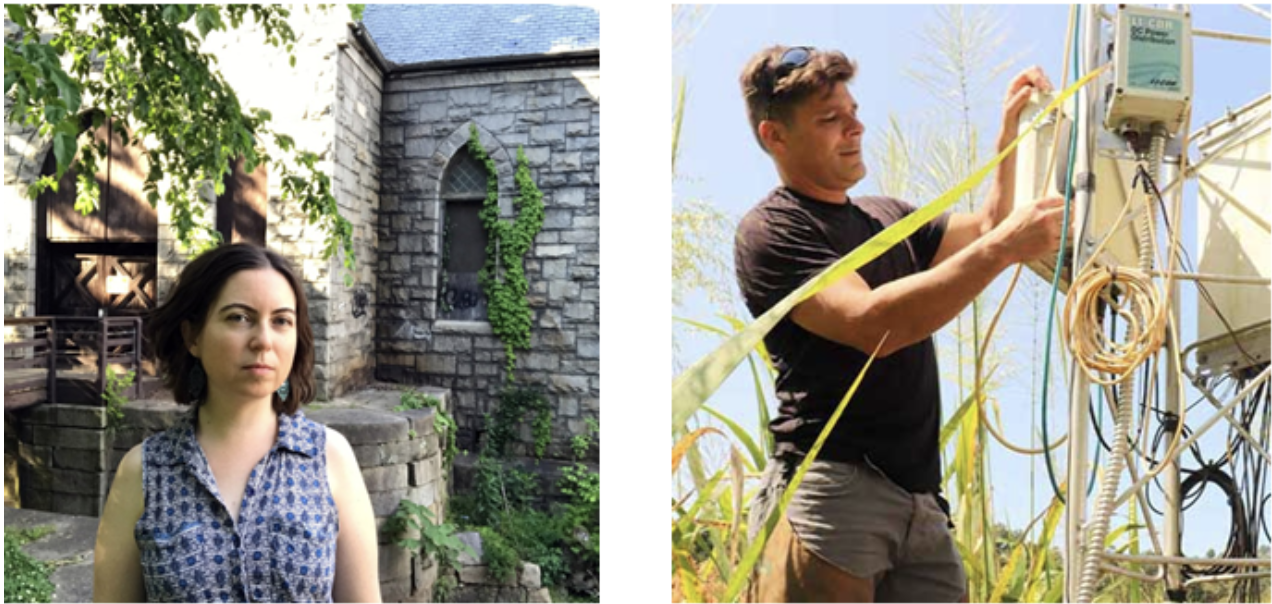
Project
Sara Bouchard is creating an electroacoustic composition for 12-voice choir and percussion which explores the role of community and networks in locating one’s own voice within a shifting landscape. Using the carbon cycle as a framework, the piece interweaves musical performance, field recordings, crowd-sourced text and flux data. Sara’s artwork bridges scientific data with personal and collective experiences of climate change, suggesting that we take cues from the more-than-human world so as to strengthen our local and global communities, forge healthy mental pathways, nourish each other and flourish in an uncertain future.
Artist Bio
Sara Bouchard is a multidisciplinary artist and composer who uses sound, performance, installation, creative coding and works on paper to interweave song, story and the landscape. Sara’s collaborations with the environment have included data sonifications, sensor-driven soundscapes and musical improvisations with organic materials. Sara has exhibited and performed internationally, including at The Aldrich Contemporary Art Museum (CT), The Center for Book Arts (NYC), ERES Foundation (Munich, Germany) and the International Conference for Live Coding (Utrecht, Netherlands). Born in Stockton, CA, Sara received her BA from Yale University in 2003 and her MFA from Virginia Commonwealth University in 2019. She currently teaches at VCUarts Department of Kinetic Imaging. Discover more of Sara’s work at sarabouchard.com and follow @seventh_sara on instagram.
Science Collaboration
Research in the Gough lab focuses on how disturbance, succession, and climate change shape carbon cycling and ecosystem structure in forests and wetlands. This research includes using large-scale field experiments, remote sensing, and modeling to study for example how forest ages affect carbon sequestration and why older forests can sustain high carbon uptake. A major effort in the Gough’s research group is collecting long-term carbon flux data from Ameriflux Core Sites at the University of Michigan Biological Station to support global modeling efforts, and as well as monitoring tidal wetlands in the Rice Rivers Center to investigate the controls on both carbon dioxide uptake and methane emissions.
Artwork
Seedling: hybrid socio-ecological meeting space.
News and Activities
January 22, 2026: PRAx musical performance of En Masse by Oregon State Vocal Ensemble in Detrick Hall, Corvallis, OR (Event info and ticketing here)
December 16, 2025: Presentation, Creative Curiosity in fluxART Reveals Beauty and Wonder of Ecosystem Science, American Geophysical Union Annual Meeting, New Orleans LA
September, 2025: Climate questionaire for crowed-sourced text as part of "En Masse"
May 18 - 27, 2025: Fellowship/residency, Longwood University’s Baliles Center for Environmental Education, Montross, VA
May 20, 2025: Presentation on in-progress research, Baliles Center for Environmental Education, Montross, VA
May 15, 2025: Presentation on acoustic ecology and listening exercises, Gough Lab retreat, Rice Rivers Center, VA
Sept 2024 – : Attending weekly Gough Lab meetings and conducting individual lab member interviews, Virginia Commonwealth University, Richmond, VA
Oct 2024 – : Attending monthly Sustainability Lab meetings, VCU’s Arts Research Center, Richmond, VA
April 23, 2025: Attending Integrative Life Sciences research showcase, Virginia Commonwealth University, Richmond, VA
April 2 - 23, 2025: Attended Paper Making class, Visual Arts Center, Richmond, VA
Mar 5, 2025: Presentation of in-progress research, Gough Lab, Virginia Commonwealth University, Richmond, VA
Mar 3, 2025: Launched ‘Seedling,’ a hybrid socio-ecological meeting space, online
Feb 26 - Mar 19, 2025: Attended Rigid Heddle Loom Weaving class, the Visual Arts Center, Richmond, VA
Oct 16 - 18, 2024: Attended Institute for Sustainable Energy and Environment Annual Symposium, Virginia Commonwealth University, Richmond, VA
Sept 5, 2024: Data Sonification breakout, Ameriflux annual meeting, Berkeley CA (Presentation slides and news story)
September 4, 2024: 18//Flux and Forest Palette presentation, Ameriflux annual meeting, Berkeley CA (news story)
Acknowledgements

